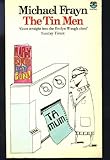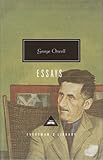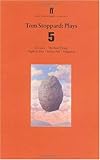
I wonder if Michael Frayn saw the launch of Google Scribe today, and smiled to himself. In 1965, Frayn wrote a book The Tin Men, which featured a mechanism that wrote newspaper articles by joining together clichéd phrases through a small number of rules.
There's an explanatory extract from it in this discussion of why you should avoid clichés when writing Poetry.
He opened the filing cabinet and picked out the first card in the set.George Orwell, in Politics and the English Language, described this way of writing:Traditionally, it read. Now there was a random choice between cards readingcoronations,engagements,funerals,weddings,comings of age,births,deaths, orthe churching of women. The day before he had pickedfunerals, and been directed on to a card reading with simple perfectionare occasions for mourning. Today he closed his eyes, drewweddings, and was signposted on toare occasions for rejoicing.
The wedding of X and Yfollowed in logical sequence, and brought him a choice betweenis no exceptionandis a case in point. Either way there followedindeed. Indeed, whichever occasion one had started off with, whether coronations, deaths, or births, Goldwasser saw with intense mathematical pleasure, one now reached this same elegant bottleneck. He paused onindeed, then drew in quick successionit is a particularly happy occasion,rarely, andcan there have been a more popular young couple.From the next selection, Goldwasser drewX has won himself/ herself a special place in the nation’s affections, which forced him to go on toand the British people have clearly taken Y to their hearts already.
Goldwasser was surprised, and a little disturbed, to realise that the word “fitting” had still not come up. But he drew it with the next card —it is especially fitting that.
This gave himthe bride/bridegroom should be, and an open choice betweenof such a noble and illustrious line,a commoner in these democratic times,from a nation with which this country has long enjoyed a particularly close and cordial relationship, andfrom a nation with which this country’s relations have not in the past been always happy.
Feeling that he had done particularly well with “fitting” last time, Goldwasser now deliberately selected it again.It is also fitting that, read the card, to be quickly followed bywe should remember, andX and Y are not merely symbols — they are a lively young man and a very lovely young woman.Goldwasser shut his eyes to draw the next card. It turned out to readIn these days whenhe pondered whether to selectit is fashionable to scoff at the traditional morality of marriage and family lifeorit is no longer fashionable to scoff at the traditional morality of marriage and family life. The latter had more of the form’s authentic baroque splendour, he decided.

As I have tried to show, modern writing at its worst does not consist in picking out words for the sake of their meaning and inventing images in order to make the meaning clearer. It consists in gumming together long strips of words which have already been set in order by someone else, and making the results presentable by sheer humbug. The attraction of this way of writing is that it is easy. It is easier—even quicker, once you have the habit—to say “In my opinion it is not an unjustifiable assumption that” than to say “I think”. If you use ready-made phrases, you not only don't have to hunt about for the words; you also don't have to bother with the rhythms of your sentences since these phrases are generally so arranged as to be more or less euphonious. When you are composing in a hurry—when you are dictating to a stenographer, for instance, or making a public speech—it is natural to fall into a pretentious, Latinized style. Tags like “a consideration which we should do well to bear in mind” or ”a conclusion to which all of us would readily assent” will save many a sentence from coming down with a bump.Clearly, Google Scribe has been trained on the vast corpus of English language text that is also used for Google Translate to come up with plausible sentence fragments. Equally clearly, that means it is bound to be plucking phrases that have been written before out of the web for you, and favouring those that have been said most often. It won't come up with a crisp, resoundingly clear phrase for you, unless it has already been said many times before.
The most likely words to follow “clocks were” now, according to Google, are “striking thirteen”. I hope Orwell would appreciate the irony.
Now, this is amusing in itself, but it is also indicative of a wider problem. If you've done much web searching for, say, home maintenance tips, you'll see a lot of prose that has either been written by a machine of this type, or by poorly paid human writers who use a very similar compositional process. We have a kind of mutated Turing Test going on all around us, where robotic writers are trying to convince robotic readers that they are human, and their stilted prose is worth presenting to the real people searching. Of course, the robots are searching too, to get the source material that is fed into their word mills to create this shambling facsimile of human prose.
It may be impressive that computers can now write bad prose like so many people do, but I do wonder about Eric Schmidt's grand vision of Google predicting what we will want to do before we think of it ourselves. Will it in fact be what we wanted, or will it be a mishmash of expected behaviours, that we'll regret on our deathbeds?
1. I wish I'd had the courage to live a life true to myself, not the life others expected of me.
This was the most common regret of all. When people realise that their life is almost over and look back clearly on it, it is easy to see how many dreams have gone unfulfilled.
 A scene in Tom Stoppard's The Real Thing sums this up well:
A scene in Tom Stoppard's The Real Thing sums this up well:He’s a lout with language. I can’t help somebody who thinks, or thinks he thinks, that editing a newspaper is censorship, or that throwing bricks is a demonstration while building tower blocks is social violence, or that unpalatable statement is provocation while disrupting the speaker is the exercise of free speech… Words don’t deserve that kind of malarkey. They’re innocent, neutral, precise, standing for this, describing that, meaning the other, so if you look after them you can build bridges across incomprehension and chaos. But when they get their corners knocked off, they’re no good any more, and Brodie knocks corners off without knowing he’s doing it. So everything he writes is jerry-built. It’s rubbish. An intelligent child could push it over. I don’t think writers are sacred, but words are. They deserve respect. If you get the right ones in the right order, you can nudge the world a little or make a poem which children will speak for you when you’re dead.People are used to typing questions into a box on Google and getting a machine's suggestions. Increasingly though, they're typing emotions into a box on Twitter or Facebook, and getting a human response instead.



